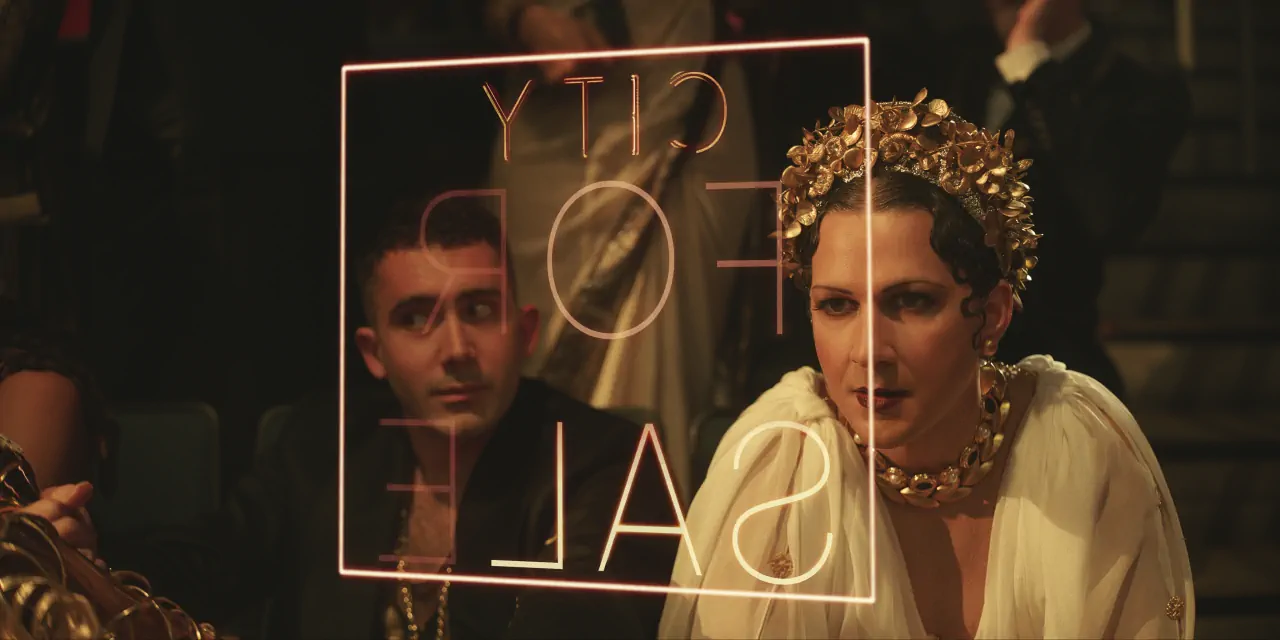Francis Ford Coppola’s Megalopolis is a visually stunning but deeply flawed exploration of utopia, blending epic ambition with baffling execution. After decades of delays, rewrites, and a massive personal investment of $120 million, Coppola delivers a film that will leave audiences divided. While the legendary director’s vision is undoubtedly bold, Megalopolis may be too erratic for most viewers to fully grasp.
A Star-Studded Cast Navigates a Confusing Plot
Set in an alternate modern reality, Megalopolis introduces audiences to a sprawling Roman-inspired metropolis. Laurence Fishburne narrates the film as Fundi Romaine, the caretaker of architect Cesar Catilina (Adam Driver), who is tasked with rebuilding the city’s crumbling infrastructure. Cesar’s discovery of a miraculous element called Megalon gives him the ability to stop time, an ability used more for visual spectacle than narrative significance.

Cesar’s nemesis, Franklyn Cicero (Giancarlo Esposito), is the city’s newly elected mayor who views Cesar’s utopian vision as impractical and dangerous. Julia (Nathalie Emmanuel), Franklyn’s daughter and a high-society figure, becomes romantically involved with Cesar, despite their fathers’ ideological clash.

The supporting cast adds depth but also more confusion. Aubrey Plaza plays Wow Platinum, a reporter and Cesar’s lover, while intellectual and emotional depth takes on the role of Clodio Pulcher, Cesar’s envious cousin. The complex web of relationships, class struggles, and political battles adds layers but often detracts from the film’s core message.
Class Struggles and Roman Allegories
Coppola uses Roman history as a backdrop for the class struggles at the heart of Megalopolis. Cesar’s radical ideas for rebuilding the city reflect a desire for social reform, but his ambitions clash with the entrenched elite, represented by Franklyn. The parallels to ancient Roman politics are intriguing, but the execution falters under the weight of pretentious dialogue and sluggish pacing.

The film critiques the rich’s exploitation of the poor, using spectacles like chariot races to distract the masses from their hardships. The themes of inequality and exploitation are evident, but Coppola’s heavy-handed approach can feel overbearing.
Over-the-Top Dialogue and Performances
The dialogue in Megalopolis is one of its biggest weaknesses. Characters often speak in a bizarre mix of Latin-inspired phrases and lofty, abstract musings. Conversations between Cesar and Julia, meant to showcase intellectual and emotional depth, come across as awkward and overly theatrical.

Aubrey Plaza’s performance as Wow Platinum is a particular low point, veering into unintentionally comical territory with overblown delivery. In contrast, Shia LaBeouf manages to shine as Clodio Pulcher, bringing a believable intensity to a film otherwise filled with disjointed performances.
Excessive Debauchery and Visual Spectacle
Coppola spares no expense in showcasing the lavish, hedonistic lifestyles of the city’s elite. The film is filled with orgiastic parties, extravagant costumes, and visual effects that dazzle but often lack narrative purpose. The scenes of excess highlight the moral decay of New Rome’s upper class, but the constant barrage of debauchery becomes overwhelming.
Watch Megalopolis (2024) Official Trailer
Visually, Megalopolis is impressive. The film’s production design and special effects are top-notch, creating a world that feels both familiar and futuristic. However, the spectacle can’t compensate for the disjointed plot and confusing character motivations.
A Romance Without Chemistry

One of the film’s central failures is the lack of chemistry between Cesar and Julia, whose romance is supposed to drive much of the plot. Despite the talents of Adam Driver and Nathalie Emmanuel, their relationship feels forced and lacks emotional depth. Without a convincing connection between the two, the film’s love story falls flat, weakening the entire narrative.
Final Thoughts: A Bold But Flawed Epic
Megalopolis is a testament to Francis Ford Coppola’s ambition, but ambition alone isn’t enough to save this chaotic film. While the visuals and scope of the story are impressive, the weak dialogue, lack of chemistry between leads, and overindulgence in spectacle make it difficult to fully engage with. Coppola’s exploration of class struggles and utopian ideals is intriguing, but ultimately, Megalopolis feels more like a collection of grand ideas that never fully come together.

For die-hard Coppola fans, Megalopolis is worth watching as a showcase of the director’s unfiltered vision. For others, it may prove too scattered and perplexing to leave a lasting impression.
Megalopolis is a production of American Zoetrope and Caesar Film LLC. It will be released theatrically on September 27th by Lionsgate.










































